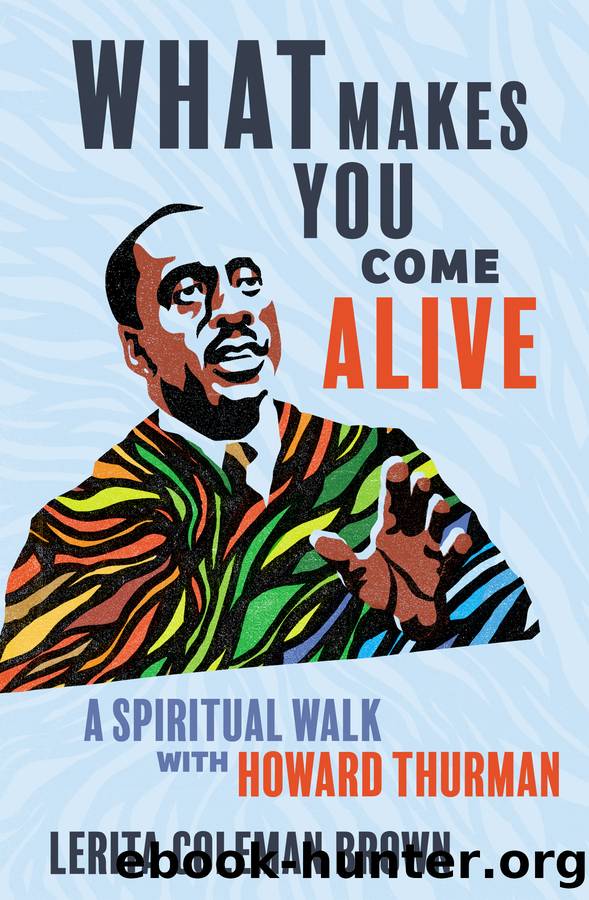What Makes You Come Alive by Lerita Coleman Brown

Author:Lerita Coleman Brown [Lerita Coleman Brown]
Language: eng
Format: epub
Publisher: Broadleaf Books
Published: 2022-08-15T00:00:00+00:00
JESUS AND THE DISINHERITED
Thurman was convinced that the churchâs disregard for the prophetic message of Jesus remained most costly for disenfranchised people. It is not surprising that early Christians failed to promote the social justice aspects of Jesusâs teachings given the atmosphere of slaughter and annihilation. Later, the institutionalization of Christianity by the Roman Empire meant social justice would not play a prominent role. Yet Thurman found in the religion of Jesus answers to his long-pursued questions about how Negroes and other dispossessed people could live with dignity and humanity even under repressive and cruel conditions. He articulated this sentiment in the form of a question: âWhat do you do with the call in your heart from God if you are living in a situation of oppression?â
In 1949, Howard Thurman published Jesus and the Disinherited, which outlined these powerful insights. Thurman wanted the term âdisinheritedâ to be part of the bookâs title, since his intent was to inspire colonized and oppressed people on and beyond American soil, including those embroiled in the anticolonial struggles in Africa, India, and Asia during the 1940s. Disinherited is an apt description for people whom dominant Christianity had literally cast out. The disinherited belonged to a caste, as Isabel Wilkerson brilliantly delineates in Caste: The Origins of our Discontentsâone that dominant Christianity had deemed unequal and unacceptable. In Jesus and the Disinherited, Thurman returns to that lawyerâs question: how could enslaved or colonized people embrace the same religion practiced by the people who subjugated and denigrated them?
Writing during the Jim Crow era, Thurman poses a set of questions in the preface. What relevance would the disinheritedââpeople who stand with their backs against the wallââfind in the religion of Jesus? How does the religion of Jesus differ from Christianity, the religion about Jesus? Thurman notes that his considerations are both personal and professional. He yearned to offer hope and resolve to his deeply wounded people, who experienced daily systemic and personal degradation.
Howard Thurman found dominant Christianity unable to cope with issues of discrimination with respect to race, religion, and national origin. He wondered whether this inability was a weakness at the heart of the religion or rather a breach of Jesusâs original teachings. Christianity also appeared to place emphasis on the futureâon heaven, where the disinherited would be released from their suffering. White Christian leaders, using the Bible, implored Negroes during the slavery and post-slavery eras to just be patient. Wait until the next life for freedom, human rights, and personal respect, they said. But Thurman knew Jesus taught that the kingdom of God is at hand. The kingdom of God is present now.
What is most brilliant about Thurmanâs analysis is his amplification of the stark parallels between Jesusâs context, as a poor, marginalized Jew living in Palestine, and the social, political, and economic milieu of American Negroes. In order to survive, most disinherited peopleâenslaved people and their descendants, sharecroppers, domestics, farmworkers, refugees, immigrants, and the undocumentedâfeel compelled to offer unmerited flattery to those in authority.
Download
This site does not store any files on its server. We only index and link to content provided by other sites. Please contact the content providers to delete copyright contents if any and email us, we'll remove relevant links or contents immediately.
| Military | Political |
| Presidents & Heads of State | Religious |
| Rich & Famous | Royalty |
| Social Activists |
Waking Up in Heaven: A True Story of Brokenness, Heaven, and Life Again by McVea Crystal & Tresniowski Alex(37020)
Empire of the Sikhs by Patwant Singh(22185)
We're Going to Need More Wine by Gabrielle Union(18086)
Hans Sturm: A Soldier's Odyssey on the Eastern Front by Gordon Williamson(16788)
Leonardo da Vinci by Walter Isaacson(11919)
The Radium Girls by Kate Moore(10917)
Educated by Tara Westover(7078)
Tools of Titans by Timothy Ferriss(6965)
How to Be a Bawse: A Guide to Conquering Life by Lilly Singh(6701)
The Last Black Unicorn by Tiffany Haddish(5081)
Permanent Record by Edward Snowden(5007)
The Rise and Fall of Senator Joe McCarthy by James Cross Giblin(4852)
Promise Me, Dad by Joe Biden(4459)
The Wind in My Hair by Masih Alinejad(4428)
The Crown by Robert Lacey(4115)
A Higher Loyalty: Truth, Lies, and Leadership by James Comey(4041)
The Iron Duke by The Iron Duke(3651)
Joan of Arc by Mary Gordon(3271)
How to be Champion: My Autobiography by Sarah Millican(3195)
